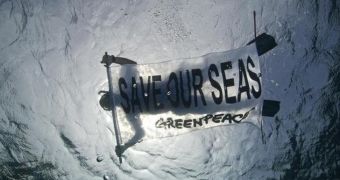Yesterday, the Intergovernmental Panel on Climate Change (IPCC, for short) issued a new report saying that climate change was real and a threat to both human society and natural ecosystems.
Greenpeace was quick to react to this report and stepped forward to argue that, as shown by the IPCC, if there ever was a right time to curb greenhouse gas emissions and protect our planet, this was it.
Although the IPCC report on climate change focuses on several issues, what Greenpeace is worried about is how climate change and the built-up of greenhouse gas emissions in out planet's atmosphere that is causing it will affect our oceans.
On its website, the organization details that, according to scientists, said emissions are bound to alter the properties of large bodies of water across the globe. Specifically, as the carbon dioxide floating about in the atmosphere seeps into oceans, the latter will become more acidic.
Add to this a constant rise in sea levels and, in time, changes in the makeup of planetary oceans will affect marine wildlife. All things considered, marine creatures found at the poles and at the tropics will be the ones hit the hardest.
Greenpeace argues that, together with human activities such as overfishing, habitat destruction and pollution, said phenomena will eventually impact food security and might even spark conflicts among various nations.
“Warming waters, changing ocean currents and chemistry mean that we are already seeing species move. Broadly speaking they are moving towards cooler waters – the polar regions or deeper seas,” the organization writes on its website.
Furthermore, “That means that tropical countries especially could see fish and crucial food sources declining dramatically from their waters. At the same time, shifting stocks of fish are likely to lead to increased conflict between fishing nations, such as we have already seen on mackerel in the North Atlantic.”
Greenpeace goes on to say that, according to the IPCC report issued this past March 31, climate change will not only make fish smaller, but will also foster a drop in their population. Specifically, it is estimated that the productivity of our oceans could drop by about 9%.
Since the world's population is gradually increasing and food demand will undoubtedly do so as well in the near future, having less fish at our disposal is something we should really be worrying about, the organization argues in a blog post on the matter at hand.
The organization concludes its summary of how climate change will affect marine wildlife by saying that, thanks to nutrient and pollution runoff originating from land, so-called oceanic dead zones, i.e. areas devoid of oxygen and, consequently, of life, will become a common sight. Needless to say, this will further affect global food security.
Despite the worrying findings of the IPCC's latest report on climate change, Greenpeace argues that it is still possible to safeguard our oceans and the creatures inhabiting them. Thus, the organization asserts that the right thing to do is to limit pollution and overfishing, and better regulate other human activities known to affect marine willdife.
In doing so, we would give marine ecosystems a fighting chance of coping with climate change by making sure that they are not forced to handle unnecessary stress. As Greenpeace puts it, “The less stress oceans face from pollution, overfishing and other human activities, the better they can cope with climate change impacts.”
Furthermore, “One of the strongest, yet simplest, solutions is to give our oceans more protection by creating Ocean Sanctuaries. It’s about building resilience, and giving our seas a fighting chance, whether it’s the Great Barrier Reef, the High Arctic, or the deep sea.”
Bottom line, protecting our seas and oceans against the effects of climate change is all about promoting sustainable fishing practices, and about not overexploiting resources that are already at risk as a result of changes brought about by said phenomenon.

 14 DAY TRIAL //
14 DAY TRIAL //